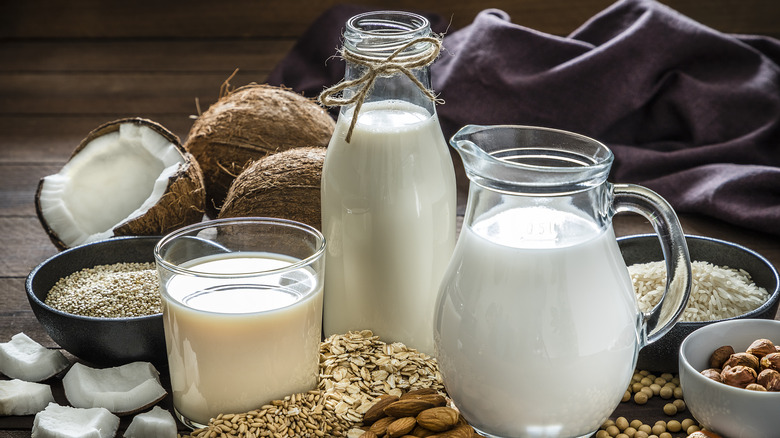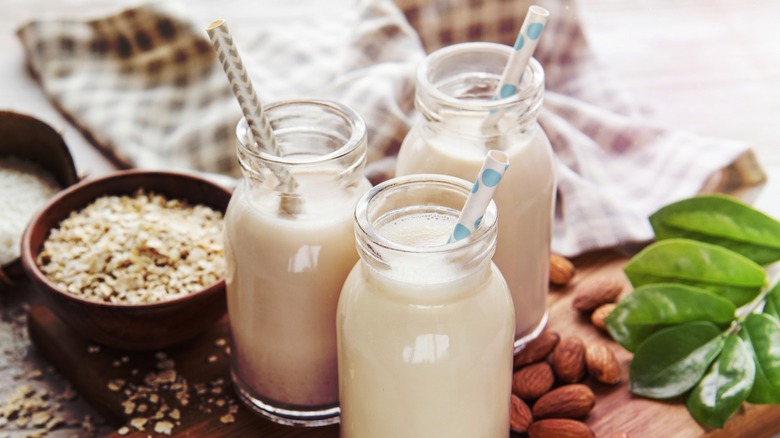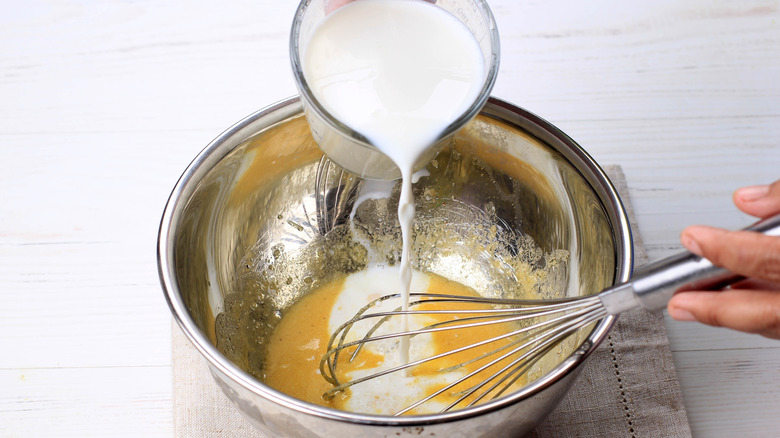The Biggest Mistake To Avoid When Baking With Dairy-Free Milk
Cutting out cow's milk from one's diet shouldn't prevent anyone from enjoying delicious baked goods. For those of us with a sweet tooth, there is nothing better than indulging in a sugary treat, regardless of whether we're lactose intolerant, vegan, or abstaining from dairy milk for another reason. Plant-based milk is a great boon to use in your cakes, cookies, and more, but home bakers should tread carefully. Plant milks vary widely, and none of them behave exactly like dairy milk.
Compared to cow's milk, plant-based milks tend to be sweeter. This makes sense when you think about how many popular dairy-free milks are derived from naturally sweet ingredients, such as almonds or coconuts, but many brands also add sugar to their products. This might sound like no biggie, but in baking, extra sugar can impact your recipe and give it a sweeter flavor profile than intended. Some of us may not mind an extra kick of sweetness, but choosing sweeter dairy-free milk for more savory recipes, like corn, broccoli and cheddar muffins, won't yield great results.
Unsweetened milk alternatives come the closest to the flavor of cow's milk, and will give you the most consistent results. Your baked goods should taste like they're meant to. However, avoiding sweet plant-based milks can be a surprisingly tricky task.
Why dairy-free milk tends to be sweeter
While plant milk might be on the sweeter side in comparison, cow's milk contains its fair share of sugar. Dairy milk is naturally sweet due to lactose, an enzyme commonly referred to as milk sugar. Unfortunately, lactose is also what makes cow's milk indigestible for some folks. In order to make plant-based milk taste closer to regular cow's milk, manufacturers add sugar to mimic the naturally sweet taste of lactose.
Additionally, the base ingredients of popular plant milks, such as soy, nuts, and oat, have distinctive flavors. These can be masked with sugar, making them taste more similar to the dairy milk they are replacing. To avoid throwing off your recipe with more sweetness than intended, you must seek out unsweetened plant milks, which can be hard if you're not careful. Many plant milk brands not only sell products with sugar added, but present these sweetened milks as the default option.
For example, the brand Silk's "original" variety of soy milk includes cane sugar as the second ingredient. You have to see out their "unsweet" variety to get a no-sugar-added soy milk for baking. On the other hand, products like coconut milk may have naturally-occurring sugars, so you need to check the label even more carefully to make sure a certain brand isn't high in sugar, despite having no extra sugar added. Shop wisely and your baking recipes will turn out as they're supposed to.
The best non-dairy milk for baking
You may wonder which non-dairy milk is best for baking overall. The best choice can depend on what changes you're making to the original recipe. If you're making a recipe entirely vegan, and not just dairy-free, your final product may lack protein from eggs (which provides structure to baked goods, among other desirable qualities) or fat from butter (which enriches foods and helps them brown in the oven). Protein and fat are also found in dairy milk, of course. You might have to tinker to figure out which type of plant milk and other ingredient substitutes work for your desserts, but the best starting point is likely soy milk.
Compared to other non-dairy milks, soy milk has higher amounts of protein. This high protein content gives baked goods the proper structure, and helps them brown in the oven, rather than staying pale. It's also easy to find soy milk products with zero sugar, making your baking process more consistent. Overall, soy milk will make your baked goods similar to how they would turn out if you used cow's milk. Another great choice is cashew milk, but it can be hard to find, so in terms of accessibility and great results, soy milk pretty much reigns supreme.


